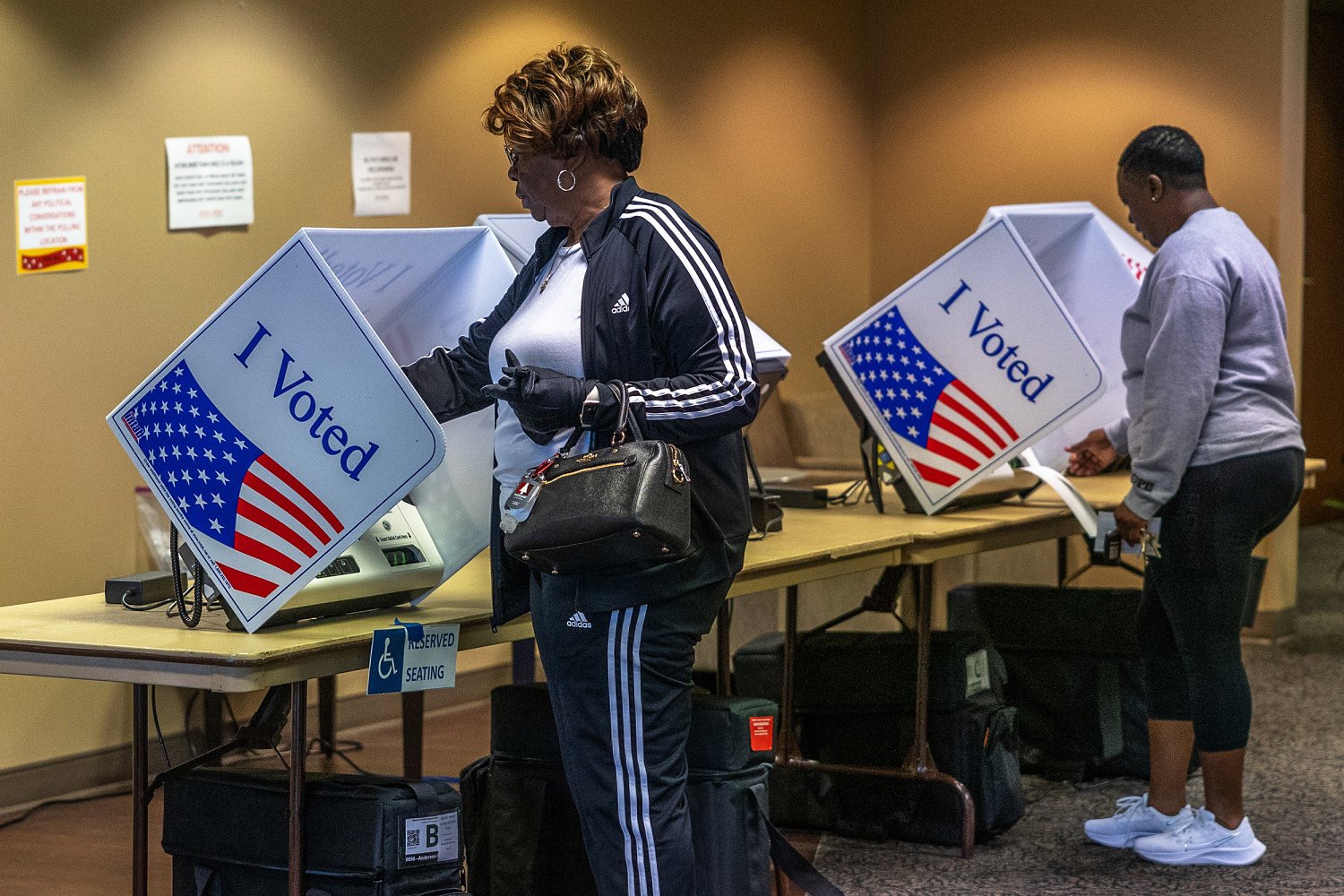COLUMBIA, S.C. — Democratic strategists, elected officials and voters in South Carolina are already eagerly looking forward, hunting for the next leader of their party after their 2024 presidential loss.
They haven’t had to look far: Prominent Democratic officials have flooded into the state, which was the first to vote in Democrats’ 2024 presidential primaries, in recent weeks. Democratic Govs. Wes Moore of Maryland, Tim Walz of Minnesota, Gavin Newsom of California and Andy Beshear of Kentucky have all crisscrossed South Carolina so far this year, while Rep. Ro Khanna, D-Calif., is also planning an event just outside of Charleston this weekend.
As potential candidates test themselves out in South Carolina, state Democrats are considering whom they want to see leading them into a post-Donald Trump era. In conversations with more than a dozen Democrats across the state, two themes emerged: They want someone ready to “fight,” but they also want someone who can appeal across party lines.
And while the two concepts might have seemed like an implausible match in the past, in today’s populist political moment, the pairing makes more sense.
Tyler Bailey, a civil rights attorney and Columbia City Council member who attended Beshear’s event here, said he’s looking for “somebody who’s not gonna just come in there and just say I’m not for Trump. It can’t just be an anti-Trump message.”
There is “a hunger of people wanting to see some real leadership on the Democrat side,” Bailey added.
Spoiling for a fighter
Over and over, in interviews across the state, Democratic leaders had one word on their lips: fight.
“People want somebody who’s going to fight,” former Democratic National Committee Chair Jaime Harrison told NBC News in an interview following Beshear’s Columbia event. “If there’s a theme that I am constantly getting, it’s they’re tired of the party being a doormat for Republicans. They want somebody who’s gonna give the Republicans just as much hell — if not more — and fight for them and their families and their communities.”
Harrison, who once chaired the South Carolina state party, said anyone without a case to make that they were strongly standing up to Republicans shouldn’t bother hitting the campaign trail.
“If you’re coming here and your backbone is like a wet noodle or spaghetti, you might as well just not even — save your airfare,” he said with a laugh.
Christale Spain, the current chair of the South Carolina Democratic Party, echoed Harrison, telling NBC News in an interview at the party’s headquarters that this moment calls for someone who is “going to fight back against the current MAGA Republicans. We’re looking for a leader that is a fighter.”
Spain added that the desire for a “fighter” has “been clear to me for the last few months, just going around the state myself, talking to voters and seeing how they respond to different things.”
Governors who have visited the state have consistently rebuked Trump, positioning themselves against his tariff agenda, against his cuts to the federal workforce and against the “One Big Beautiful Bill Act,” the massive GOP domestic policy package that congressional Republicans passed earlier this month.
“Make no mistake,” Beshear told union members at the South Carolina AFL-CIO’s annual convention in Greenville. “What Trump and his congressional enablers have just done is a direct attack on rural America and on Southerners like us. It is a betrayal.”
Speaking across party lines
Beyond looking for a fighter at this moment, Democrats in South Carolina are also looking ahead to a post-Trump era, when dozens of national Democratic leaders seem poised to throw their hat in the ring in a 2028 presidential primary.
And former South Carolina Gov. Jim Hodges, the last Democrat to serve in the state’s governor’s mansion, summed up what he thought his fellow primary voters should be looking for: someone who “knows how to win.”
For a lot of Democrats who spoke to NBC News, that means a focus on who can draw in voters of all political stripes.
“I hear several things consistently. … It’s critically important that we choose well in this next election cycle, whether we pick somebody who can draw independent voters, rally the base and get some Republican votes,” Hodges told NBC News in an interview following Beshear’s Wednesday meet-and-greet.
Towner Magill, a Democrat who attended Beshear’s meet-and-greet in Charleston on Thursday, echoed Hodges.
“I’m looking for a uniter, not just in the Democratic Party. I think we need to run a uniter, but I also think that maybe we need a uniter in the White House,” Magill told NBC News.
A call for plainer language and clearer issues
Many Democrats in South Carolina said that to unite voters across party lines, Democratic leaders have to remain laser-focused on certain issues.
“We stopped talking about issues that, you know, that working-class folks care about: jobs, health care, education, community safety,” Hodges said. “That’s why we did more poorly with working-class voters — white, Black, Latino — because we stopped talking about the issues they cared about.”
“There needs to be an adjustment in our message to addressing the concerns that they have about their own lives,” the former governor added.
State Sen. Tameika Isaac Devine called the messaging she’s hoping to hear from potential Democratic candidates a focus on “real things.”
“What I think most people are looking for is somebody who actually they feel like is speaking to them about real things,” Isaac Devine told NBC News after Beshear’s Columbia event.
South Carolina Democrats want leaders who are “speaking real things, and not just … the culture wars or the political correct terms, but actually can talk to what their pain point is. They want people who are going to give solutions,” Isaac Devine added.
South Carolinians aren’t alone in that desire. Other rising Democratic leaders, including freshman Sens. Elissa Slotkin of Michigan and Ruben Gallego of Arizona have also called for Democrats to stop using words like “oligarchy” or what Gallego calls “Ivy League-tested terms” — though Bernie Sanders pushed back on the criticism of his anti-oligarchy activism.
Harrison pointed to the constant push for Democrats to use certain inclusive or technical language as a reason why some voters may have viewed Democratic candidates as inauthentic.
“For so long, I feel like Democrats, we put ourselves in straitjackets in terms of our language and how we talk to people and how we connect with folks,” Harrison said.
“We have to let our authentic selves step out. That means that we’ve got to be willing to take risks. That means that we should not be shy about making mistakes, because that makes us more human and more relatable,” he added.
Bailey, the city council member in Columbia, pointed to character and relatability as something that could prove a major selling point for voters in his state.
“I think the relatability, people factor, is gonna be important. Because, you know, most communication is nonverbal,” he said. “You can get a lot from somebody who’s, for example, walks around scared, doesn’t engage, doesn’t talk, can’t look you in the eye, can’t shake your hand, seems, like, out of place eating fried chicken [and] would rather just have wine and cheese.”



